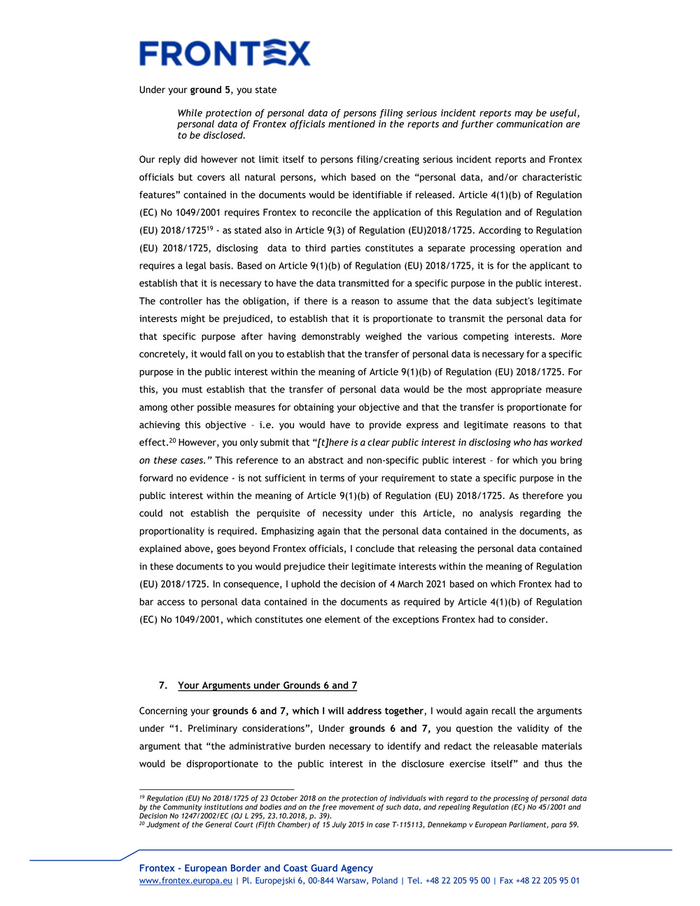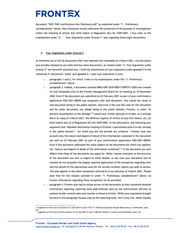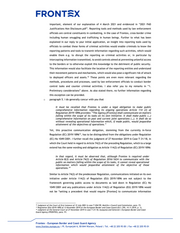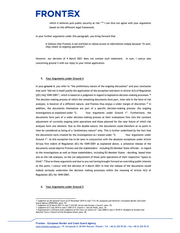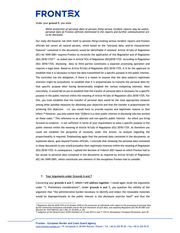Microsoft Word - PAD-2021-00105-18 May 2021
Dieses Dokument ist Teil der Anfrage „Responses to access to documents in 2021“
Application 2 "all the remaining documents, if there are any" As agreed, this application is further to your application 1, PAD-2020-00217 "all the SIRs since July 2019 that you have sent to other people in response to their 1049/2001 requests." I note your arguments in your confirmatory application: On 13 November 2020 I filed an access to documents request asking for: “All Serious Incident Reports (SIRs) filed between July 2019 and now” The request and all subsequent information can be found at https://eur02.safelinks.protection.outlook.com/?url=https%3A%2F%2Ffragdenstaat.de%2Fanfra ge%2Fsirs-since-july- 2019%2F&data=04%7C01%7Cfrontex%40frontex.europa.eu%7Cfa2fba88f41b4e4f717408d8ef 985532%7C1a17d6bf51554e22bf292ba5da77f037%7C0%7C0%7C637522785446023787%7CUnknown %7CTWFpbGZsb3d8eyJWIjoiMC4wLjAwMDAiLCJQIjoiV2luMzIiLCJBTiI6Ik1haWwiLCJXVCI6Mn0%3D %7C3000&sdata=j4AUz79hLSydQmcyS838p2mXjYMjgz7t%2BvKwIhadxdk%3D&reserved= 0 The request was formulated in a sufficiently precise manner, and there is no suggestion to the contrary. Frontex answered in two batches and registered the second part of my request on 21 January 2021. On 4 March 2021, by letter with reference TO/PAD-2020-0027, Frontex granted partial access to 19 documents and identified 26 documents falling under the scope of my request, denying 1 In accordance with Article 8(2) of Regulation (EC) No 1049/2001 of 30 May 2001 regarding public access to European Parliament, Council and Commission documents (OJ L 145, 31.5.2001, p. 43). Frontex - European Border and Coast Guard Agency www.frontex.europa.eu | Pl. Europejski 6, 00-844 Warsaw, Poland | Tel. +48 22 205 95 00 | Fax +48 22 205 95 01

access to 12 of them under Article 4(2) second indent, denying access to 12 of them under Article 4(2) third indent of Regulation (EC) No 1049/2001 and denying access to these 24 documents as well as to two additional documents under nine reasons that Frontex referred to in an attached legend. Out of these nine reasons, though, two were referring to ongoing investigations and ongoing court proceedings which were already mentioned by Frontex in its main letter. Grounds of Objection: I consider that Frontex’s refusal to provide access to the documents requested is misconceived, for the following reasons. Ground 1. Frontex’s claim that investigations would be hampered is unlawful Frontex vaguely invokes Article 4(2) third indent of Regulation (EC) No 1049/2001 in relation to 12 documents in order to protect “the purpose of investigations”. Frontex has not stated which “investigations” have to be protected and why releasing serious incident reports would harm the protection of investigations. Frontex is required, in accordance with the established case law of the CJEU, to explain how disclosure would “specifically and actually” cause harm to one of the interests listed under Article 4 of Regulation 1049/2001. By failing to provide any information at all regarding the investigations Frontex claims to be protecting, the agency is failing to comply with its transparency obligations. Furthermore, it’s worth recalling that Frontex must demonstrate, upon refusing access to documents, how the purported risk to investigations is “foreseeable and not purely hypothetical”. Given that it has failed even to particularise the nature of the purported risk or the investigations affected by the risk, Frontex’s response cannot be considered to reach the threshold of “foreseeable and not purely hypothetical”. Ground 2. Frontex’s claim that court proceedings have to be protected is unlawful Frontex vaguely claims to invoke Article 4(2) second indent of Regulation (EC) No 1049/2001 in relation to 12 documents in order to protect “court proceedings”. Once again, Frontex has not stated which “court proceedings” precisely would be undermined and why releasing serious incident reports would harm the protection of court proceedings. At the time of writing, there are no court proceedings before the Courts of the European Union that concern the requested documents,and Frontex has failed to establish whether the application of this exception refers to a case involving courts at a Member State level and, if so, which. For this reason, Frontex has yet again failed to comply with EU case law whereby the agency must explain how disclosure would “specifically and actually” harm the protected interest. In its response letter, Frontex has also failed to explain how the purported risk to court proceedings is “foreseeable and not purely hypothetical”. Ground 3. Frontex’s claim that public security would be endangered is unlawful Frontex vaguely claims that information from the documents cannot be released under Article 4(1)(a) first indent of Regulation (EC) No 1049/2001 for five reasons, namely the protection of “sensitive operational information”, the protection of “number and type of technical equipment”, the protection of “operational areas of the Joint Operations”, the protection of “number and profile of human resources” and protection of “reporting tools and methods used by law enforcement officials”. To this extent,, Frontex only broadly claims that the information would “hamper the effectiveness of Frontex operations and jeopardise the efforts carried out by the European Union and Member States to curtail criminal activities at the external borders”, without actually explaining how, or demonstrating that this chain of events is not purely hypothetical. Therefore once again, Frontex is failing to comply with the established case law of the CJEU which requires the agency to explain how the purported risk to public security would “specifically and actually” take place, and why this risk is “foreseeable and not purely hypothetical”. Part of Frontex’s refusal relies on the assertion that the documents requested “refer to details of the operational area". Notwithstanding that Frontex fails to identify the nature of the Frontex - European Border and Coast Guard Agency www.frontex.europa.eu | Pl. Europejski 6, 00-844 Warsaw, Poland | Tel. +48 22 205 95 00 | Fax +48 22 205 95 01

relevant “details” to which it refers, detailed information relating to Frontex’s operational area is in fact already in the public domain. By way of example, a publicly available note dated 05/11/2020 from the Frontex Management Board meeting on 10 November 2020 (Reference: BMD/GRP-2018-00017/899751/2020) contains explanations and graphics with specific information relating to the Frontex “operational theatre”. It follows that mere disclosure of the requested documents would not “undermine the protection of the public interest as regards public security” as alleged. Frontex also alleges that the documents requested contain detailed information related to reporting tools and methods used by law enforcement officials to conduct border control tasks and counter criminal activities. According to Frontex, its disclosure would jeopardize the implementation of ongoing and future operations, and thus facilitate irregular migration and trafficking in human beings as the effectiveness of law enforcement measures would be significantly reduced.” Frontex’s reliance upon the alleged risk posed to public security as a result of disclosure of documents relating to “reporting tools” is ill-founded. First, Frontex uses the term “reporting tools” vaguely without specifying the nature of the “reporting tools” to which it refers. Second and in any event, Frontex fails to adequately explain how disclosure of these “reporting tools” would in fact jeopardize future operations (and, by extension, public security). It merely makes an assertion to that effect. It must be recalled that Frontex is under a legal obligation to make public comprehensive information regarding its ongoing operations Article 114 (2) of Regulation 2019/1896 provides: “The Agency [Frontex] shall communicate on matters falling within the scope of its tasks on its own initiative. It shall make public (…) comprehensive information on past and current joint operations (…). It shall do so without revealing operational information which, if made public, would jeopardise attainment of the objectives of operations.” It follows that Frontex is not entitled to refuse access to information simply because “In sum, they relate to ongoing operations”. The terms of Article 114(2) indicate that the mere fact that requested documents may relate to “ongoing operations” does not relieve the agency from its transparency obligations. Rather, Frontex is required to make public the relevant information without revealing sensitive details “which would jeopardise attainment of the objectives of operations”, i.e. provided that it can justify the refusal of relevant information on the basis of the exceptions provided in Article 4 of Regulation 1049/2001 and in compliance with EU case law. Ground 4. Frontex’s claim that internal decision-making would be hampered is unlawful Frontex vaguely claims that information from the documents cannot be released under 4(3) of Regulation (EC) No 1049/2001 as it would hamper Frontex’s internal decision making process. Frontex refers both to its risk analyses which allegedly “constitute a specific form of internal decision-making processes” and to “ongoing discussions taking place within Frontex and within its auspices”. The Regulation’s 1049/2001 explicit goal is to improve the transparency of the decision-making process. In this spirit, the Court of Justice of the European Union has held that the preliminary nature of documents that relate to a decision-making process does not in itself justify the application of the exception laid down in Article 4(3) of Regulation 1049/2001. The Court has also held that the fact that no agreement has yet been reached on the issues being debated does not therefore establish that the decision-making process is undermined by disclosure. To this regard, Frontex’s broad claim that the requested documents relate to unspecified “discussions” and its “risk analysis” does not offer substantial proof as to how the decision- making process would be seriously and foreseeably undermined. It follows that, in absence of such proof, Frontex’s argument that disclosure would “erode the mutual trust among the participants” remains purely hypothetical and unfounded, especially because Frontex has not even stated which discussions the documents relate to and who is participating in these negotiations. Ground 5. Frontex’s claim that personal data have to be protected is unlawful Frontex - European Border and Coast Guard Agency www.frontex.europa.eu | Pl. Europejski 6, 00-844 Warsaw, Poland | Tel. +48 22 205 95 00 | Fax +48 22 205 95 01

Frontex claims that personal data “and/or characteristic features which could lead to the identification of individuals” from the documents cannot be released under 4(1)(b) of Regulation (EC) No 1049/2001. While protection of personal data of persons filing serious incident reports may be useful, personal data of Frontex officials mentioned in the reports and further communication are to be disclosed. There is a clear public interest in disclosing who has worked on these cases. Ground 6. Frontex’s failure to provide partial disclosure is unlawful Article 4 (6) of Regulation 1049/2001 provides: “If only parts of the requested document are covered by any of the exceptions, the remaining parts of the document shall be released.” The proposition that the release of the totality or even a substantial part of the 26 documents requested would undermine court proceedings or investigations is not sustainable. Partial disclosure must therefore be considered, consistently with the provisions of Article 4(6) of Regulation 1049/2001 and the principle of widest possible access. Frontex alleges that partial access cannot be granted to the requested documents “as their redaction would be disproportional in relation to the parts that are eligible for disclosure, simultaneously undermining the principle of sound administration.”. This is inconsistent with the terms of Article 4(6), which provides that the scope of disclosure is determined with reference to the exceptions laid out in Article 4, rather than a test of proportionality. Ground 7. There is a clear public interest in the disclosure of the requested documents Frontex alleges that “the administrative burden necessary to identify and redact the releasable materials would be disproportionate to the public interest in the disclosure exercise itself.” That assertion is false. The documents requested are likely to contain important information on fundamental rights violations that are essential to assess whether Frontex took part in pushbacks or observed them. The discussion over the invocation of Article 46 of the Frontex regulation can only be assessed properly with all information that are available. Media reports over Frontex’ involvement in fundamental rights violations have sprung up since last summer. There have been regular calls for the Frontex Executive Director to resign over allegations of fundamental rights violations. The European Parliament has set up a Frontex scrutiny committee over the allegations. A great public interest is therefore undeniable when it comes to the release of the requested documents. Ground 8. Comparable Information is online Hundreds of serious incident reports are already disclosed and online. Thus, comparable information is already accessible. Ground 9. Frontex is not allowed to prohibit the sharing of these documents Frontex stated that “the copyright of the document/s rests with Frontex and making this/these work/s, available to third parties in this or another form without prior authorisation of Frontex is prohibited.” As an EU agency, Frontex does not have legal grounds to claim copyright and does not hold the power to prohibit the use of information under 1049/2001. The documents do not reach the threshold of originality. Its contents were not created by Frontex themselves. Frontex has to retract the “prohibition” as well as its copyright claim. I further note that in our reply of 4 March 2021, it was stated that a total of 26 documents could not be made available to you. However, I rectify the statement in said reply that “[t]wo more documents cannot be released due the applicability of the exceptions outlined in the attached legend”, as one document of these was indeed attached - in a redacted form based on “2021 PAD Justifications Non Frontex - European Border and Coast Guard Agency www.frontex.europa.eu | Pl. Europejski 6, 00-844 Warsaw, Poland | Tel. +48 22 205 95 00 | Fax +48 22 205 95 01

Disclosure.pdf2”- to our reply of 4 March 2021. Consequently, 25 documents could not be released on 4 March 2021. 1. Preliminary considerations Before addressing your arguments individually, please allow me to recall the first and second paragraph of Frontex reply of 4 March 2021, which read: Please be informed that 12 documents falling under your application cannot be released as, in addition to the exceptions outlined in the attached legend that apply to them, their disclosure would undermine the protection of the purpose of investigations within the meaning of Article 4(2) third indent of Regulation (EC) No 1049/2001. Twelve further documents cannot be released as, in addition to the exceptions outlined in the attached legend that apply to them, their disclosure would undermine the protection of court proceedings within the meaning of Article 4(2) second indent of Regulation (EC) No 1049/2001. [emphasis added] The reference to ongoing investigations, respectively court proceedings, in the said reply are thus an element in addition to the other elements indicated in “2021 PAD Justifications Non Disclosure.pdf”, i.e. personal data and in regard to Article 4(1)(a) first indent of Regulation (EC) No 1049/2001: sensitive operational information, number and type of technical equipment, operational area of joint operation, number and profile of human resources, internal decision-making, as well as reporting tools and methods used by law enforcement officials (emphasis added). Frontex, when considering a refusal to grant access to a document whose disclosure would undermine the protection of the public interest as regards public security as laid down in Article 4(1)(a) first indent of Regulation (EC) No 1049/2001, enjoys a wide discretion for the purpose of determining3 whether such disclosure to the public would undermine the interests protected by that provision. In our reply of 4 March 2021, we provided ample information to allow you “to understand the reasons why access to the information requested”4 regarding these incidents and why the information contained was refused. I would thus like emphasise that if the information contained therein were to fall into the hands of the criminal gangs involved in migrant smuggling and trafficking of human beings, they would be able to obtain an insight into patrolling areas and schedules as well as human resources deployed and their distribution in the area, types of the deployed assets, their movement patterns, and tools and methods applied by law enforcement officials in ongoing and future operations in the same areas. This information by itself - but especially in combination with other sources - would allow such gangs to adapt their modus operandi accordingly in order to circumvent border surveillance in current and future operations or to inflict harm on officials and assets.5 While further information cannot be provided without jeopardizing that the interests, which the exceptions are specifically designed to protect, are undermined by de facto revealing the contents of the documents “and thereby depriving the exception of its very purpose”6, the reasons provided on 4 March 2021 and further elaborated in here in regard to these interests clearly 2 Made available to you on 4 March 2021. 3 Judgment of the General Court of 27 November 2019 in case T-31/18, Izuzquiza and Semsrott v European Border and Coast Guard Agency (FRONTEX), para 65. 4 Judgment of the General Court of 27 November 2019 in case T-31/18, Izuzquiza and Semsrott v European Border and Coast Guard Agency (FRONTEX), para. 110. 5 Judgment of the General Court of 27 November 2019 in case T-31/18, Izuzquiza and Semsrott v European Border and Coast Guard Agency (FRONTEX), para 73. 6 Judgment of the General Court of 7 February 2018 in case T‑851/16, Access Info Europe v European Commission, para. 122. Frontex - European Border and Coast Guard Agency www.frontex.europa.eu | Pl. Europejski 6, 00-844 Warsaw, Poland | Tel. +48 22 205 95 00 | Fax +48 22 205 95 01

show that there is a foreseeable, and not merely hypothetical, risk to public security in regard to them. It is thus that justifies invoking these exceptions in regard to Article 4(1)(a) first indent of Regulation (EC) No 1049/2001 within the wide discretion which is accorded to Frontex for the application of that exception.7 2. Your Arguments under Ground 1 Coming now to your ground 1, I note that it was in addition to the exceptions under Article 4(1)(a) first indent and, as will be demonstrated below, (b) of Regulation (EC) No 1049/2001 that Frontex had to invoke the exception of ongoing investigations within the meaning of Article 4(2) third indent of Regulation (EC) No 1049/2001. These investigations entailed Frontex officers, and partly in addition EU Member State officials, establishing facts in order to assess the – developing - situations in these serious incidents8 which also formed the basis for the creation of these Serious Incident Reports. As establishing facts must be undertaken in a sphere of confidentiality, a unilateral disclosure of these documents would have undermined the trust of all parties involved in these investigations and undermined the cooperation of stakeholders. In addition, it is thus that even a partial disclosure would have compromised the investigators’ effective access to the facts as, based on these documents, the investigated facts could have been distorted in such a way as effectively depriving the investigators of the possibility to conduct their investigations without interference. This is particularly relevant for the areas covered by serious incidents in regard to which the referred-to absolute exceptions under Article 4(1)(a) of Regulation (EC) No 1049/2001 apply. While I have to ask for your understanding that for these reasons, I am not at liberty to provide further information as not to deprive this exception and those exceptions referred to in “1. Preliminary considerations” above of their very purpose, I conclude that releasing the 12 documents would have led to a foreseeable risk for the purpose of the investigations being undermined. Furthermore, as at this point you do not submit any argument regarding the existence of an overriding public interest, I come to the same conclusion as already expressed in our reply of 4 March 2021. 3. Your Arguments under Ground 2 Further to my reconsideration of the 12 documents falling under your ground 2, I am pleased to inform you that four of them are herewith attached; necessary redactions indicated therein are based on “2021 PAD Justifications Non Disclosure.pdf”9. In regard to the other eight documents for which a release was not deemed possible on 4 March 2021 as, in addition to the exceptions under Article 4(1)(a) first indent and, as will be demonstrated below, (b) of Regulation (EC) No 1049/2001, such would have “undermine[d] the protection of court proceedings within the meaning of Article 4(2) second indent of Regulation (EC) No 1049/2001”, I rectify this statement. Consequently, I come to the conclusion that these eight Serious Incident Reports cannot be released as, in addition to the exceptions outlined in the 7 Judgment of the General Court of 27 November 2019 in case T-31/18, Izuzquiza and Semsrott v European Border and Coast Guard Agency (FRONTEX), para 74. 8 Judgment of the Court of Justice of 7 September 2017 in case C-331/15 P, Schlyter v Commission, para. 47. 9 Made available to you on 4 March 2021. Frontex - European Border and Coast Guard Agency www.frontex.europa.eu | Pl. Europejski 6, 00-844 Warsaw, Poland | Tel. +48 22 205 95 00 | Fax +48 22 205 95 01

document “2021 PAD Justifications Non Disclosure.pdf” as explained under “1. Preliminary considerations“ above, their disclosure would undermine the protection of the purpose of investigations within the meaning of Article 4(2) third indent of Regulation (EC) No 1049/2001. I thus refer to the explanations under “2. Your Arguments under Ground 1” also regarding these eight documents. 4. Your Arguments under Ground 3 As therefore out of the 26 documents that were deemed non-releasable on 4 March 2021, one document was actually released to you then and four more documents, as I stated under “3. Your Arguments under Ground 2” are herewith attached now, I limit my examination of your arguments under ground 3 to the remaining 21 documents. Under your ground 3, I note your arguments in your: o paragraphs 1 and 2, for which I refer to my explanations under the “1. Preliminary considerations” above. o paragraph 3. Indeed, a document entitled BMD/GRP-2018-00017/899751/2020 was created for and releasable only to the Frontex Management Board for its meeting on 10 November 2020. Even if the document you submitted on 22 February 2021 as part of your confirmatory application PAD-2021-00049 was congruent with said document, this would not result in said document being in the public domain. And even if this was the case for this document and for other documents you allege being in the public domain, Frontex, in order “to prevent exacerbation of the damage”10 would have further grounds to invoke, as it already did in its reply of 4 March 2021, the different aspects of Article 4(1)(a) first indent, (b), (2) third indent and (3) of Regulation (EC) No 1049/2001. In the alternative, and following your argument that “detailed information relating to Frontex’s operational area is in fact already in the public domain” – for which you did not provide any evidence - Frontex took into account only the nature and degree of detail of the information contained in the document you sent on 22 February 2021 as part of your confirmatory application PAD-2021-00049. Even if this document addressed the same subject as the documents for which you applied, the “nature and degree of detail of the information contained”11 in the document you sent differs from those of the documents you apply for. While I cannot comment on the accuracy of the document you sent in regard to these details, in any case your document and its content do not prejudice the legally required application of the exceptions regarding inter alia the details of the operational area for the serious incident reports you seek to access. This also applies to the other exceptions referred to in our decision of 4 March 2021. Please note that for the reasons outlined in under “1. Preliminary considerations” above, no further information regarding these exceptions can be provided. o paragraph 4. Frontex also had to refuse access to the documents as they contained detailed information regarding reporting tools and methods used by law enforcement officials to conduct border control tasks and counter criminal activities. While your arguments brought forward in this paragraph focuses only on the reporting tools, this is only one, albeit equally 10 Judgment of the Court of Justice of 7 June 2013 in case T-93/11, Stichting Corporate Europe Observatory v Commission, para. 64. 11 Judgment of the Court of first Instance of 12 July 2001 in case T-204/99, Mattila v Council and Commission, para. 64. Frontex - European Border and Coast Guard Agency www.frontex.europa.eu | Pl. Europejski 6, 00-844 Warsaw, Poland | Tel. +48 22 205 95 00 | Fax +48 22 205 95 01

important, element of our explanation of 4 March 2021 and evidenced in “2021 PAD Justifications Non Disclosure.pdf”. Reporting tools and methods used by law enforcement officials are central constituents in combatting, in the case of Frontex, cross-border crime including human smuggling and trafficking in human beings. Further to what has been explained in our reply to your initial application, an insight into reporting tools used by officials to combat these forms of criminal activities would enable criminals to know the reporting patterns and tools to transmit information regarding such activities, which would enable them e.g. to disrupt the reporting on criminal activities or, in particular by intercepting information transmitted, to avoid controls aimed at preventing unlawful access to the borders or to otherwise exploit this knowledge to the detriment of public security. This information would also facilitate the location of the reporting entities and understand their movement patterns and mechanisms, which would also pose a significant risk of attack to deployed officers and assets.12 These points are even more relevant regarding the methods, procedures and processes, used by law enforcement officials to conduct border control tasks and counter criminal activities. I also refer you to my remarks in “1. Preliminary considerations” above. As also stated there, no further information regarding this exception can be provided. o paragraph 5. I do generally concur with you that It must be recalled that Frontex is under a legal obligation to make public comprehensive information regarding its ongoing operations Article 114 (2) of Regulation 2019/1896 provides: “The Agency [Frontex] shall communicate on matters falling within the scope of its tasks on its own initiative. It shall make public (…) comprehensive information on past and current joint operations (…). It shall do so without revealing operational information which, if made public, would jeopardise attainment of the objectives of operations.” Yet, this proactive communication obligation, stemming from the currently in-force Regulation (EC) 2019/189613, has to be distinguished from the obligations under Regulation (EC) No 1049/2001. I further recall the judgment of 27 November 2019 in Case T-31/18, in which the Court held in regard to Article 74(2) of the preceding Regulation, which to a large extend has the same wording and obligation as Article 114(2) of Regulation (EC) 2019/1896: In that regard, it must be observed that, although Frontex is required under Article 8(3) and Article 74(2) of Regulation 2016/1624 to communicate with the public on matters falling within the scope of its tasks, it cannot reveal operational information which would jeopardise attainment of the objective of those operations.14 Similar to Article 74(2) of the predecessor Regulation, communications initiated on its own initiative under Article 114(2) of Regulation (EU) 2019/1896 are not subject to the framework governing public access to documents as laid down in Regulation (EC) No 1049/2001 and any publications under Article 114(2) of Regulation (EU) 2019/1896 would not be “setting a precedent that would require [Frontex] to communicate information 12 Judgment of the Court of first Instance of 12 July 2001 in case T-204/99, Mattila v Council and Commission, para. 73. 13 Regulation (EU) 2019/1896 of 13 November 2019 on the European Border and Coast Guard (OJ L 295, 14.11.2019, p. 1). 14 Judgment of the General Court of 27 November 2019 in case T-31/18, Izuzquiza and Semsrott v European Border and Coast Guard Agency (FRONTEX), para. 91. Frontex - European Border and Coast Guard Agency www.frontex.europa.eu | Pl. Europejski 6, 00-844 Warsaw, Poland | Tel. +48 22 205 95 00 | Fax +48 22 205 95 01
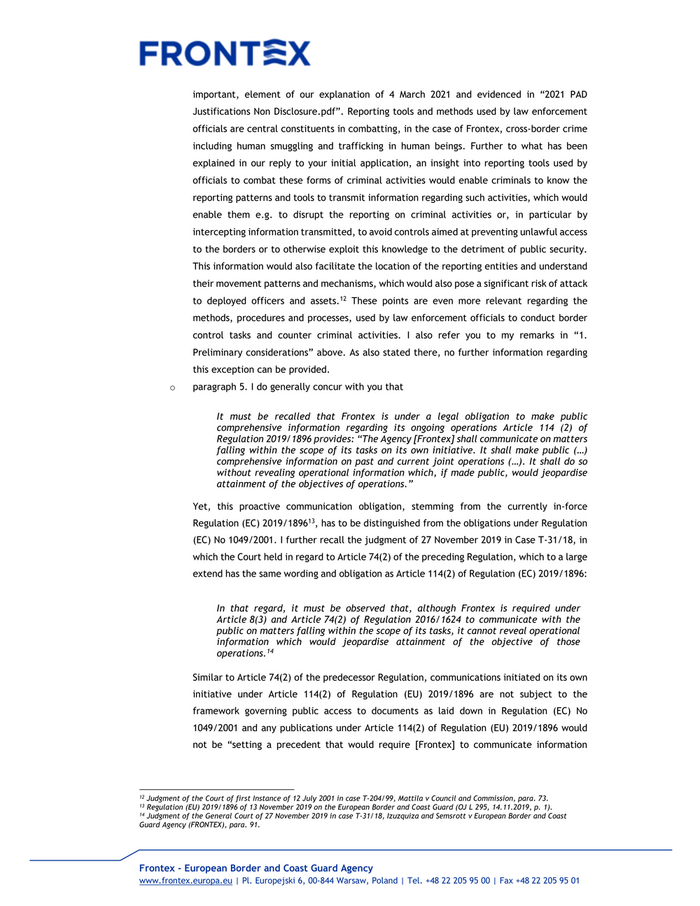
which it believes puts public security at risk.”15 I can thus not agree with your arguments based on this different legal framework. In your further arguments under this paragraph, you bring forward that It follows that Frontex is not entitled to refuse access to information simply because “In sum, they relate to ongoing operations”. However, our decision of 4 March 2021 does not contain such statement. In sum, I concur also concerning ground 3 with our reply to your initial application. 5. Your Arguments under Ground 4 In your ground 4, you refer to “the preliminary nature of the ongoing discussions” and your conclusion that such “did not in itself justify the application of the exception laid down in Article 4(3) of Regulation [(EC) No] 1049/2001”, which is based on a judgment in regard to legislative decision-making processes. 16 The decision-making process of which the remaining documents form part, inter alia in the form of risk analyses, is however of a different nature, and Frontex thus enjoys a wider margin of discretion.17 In addition, the documents themselves are part of a specific decision-making process: the ongoing investigations as explained under “2. Your Arguments under Ground 1”. Furthermore, the documents form part of a wider decision-making process as their evaluations flow into the constant adjustment of currently ongoing joint operations and those planned for the near future of which risk analyses form one element. Due to this double-nature, the documents could therefore at no point in time be considered as being of a “preliminary nature” only. This is further underlined by the fact that the documents were created for the investigations as I stated under “2. Your Arguments under Ground 1”. As this exception has to be seen in conjunction with the absolute exceptions under Article 4(1)(a) first indent of Regulation (EC) No 1049/2001 as explained above, a unilateral release of the documents would deprive Frontex and the stakeholders – including EU Member State officials - in regard to the investigations as well as those stakeholders, including EU Member States - deciding, based inter alia on the risk analyses, on the (re-)adjustment of those joint operations of their respective “space to think”.18 Due to these arguments and due to you not having brought forward an overriding public interest at this point, I concur with the decision of 4 March 2021 in that the release of the documents would indeed seriously undermine the decision making processes within the meaning of Article 4(3) of Regulation (EC) No 1049/2001. 6. Your Arguments under Ground 5 15 Judgment of the General Court of 27 November 2019 in case T-31/18, Izuzquiza and Semsrott v European Border and Coast Guard Agency (FRONTEX), para. 93. 16 Judgment of 22 March 2011 in case T-233/09, Access Info Europe v Council, para. 76. 17 Judgment of 3 July 2014 in case C-350/12 P, Council v. Van de Veldt, para. 16. 18 Argumentum e contrario from Judgment of the Court of Justice of 1 July 2008 in case C-39/05 P, Kingdom of Sweden and Maurizio Turco v Council of the European Union, para. 46. Frontex - European Border and Coast Guard Agency www.frontex.europa.eu | Pl. Europejski 6, 00-844 Warsaw, Poland | Tel. +48 22 205 95 00 | Fax +48 22 205 95 01
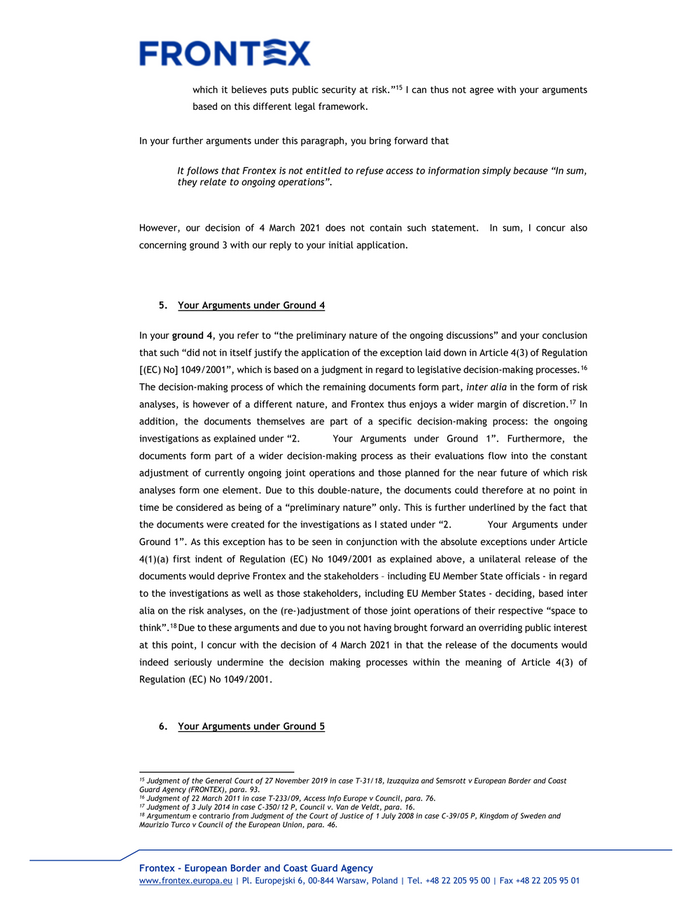
Under your ground 5, you state While protection of personal data of persons filing serious incident reports may be useful, personal data of Frontex officials mentioned in the reports and further communication are to be disclosed. Our reply did however not limit itself to persons filing/creating serious incident reports and Frontex officials but covers all natural persons, which based on the “personal data, and/or characteristic features” contained in the documents would be identifiable if released. Article 4(1)(b) of Regulation (EC) No 1049/2001 requires Frontex to reconcile the application of this Regulation and of Regulation (EU) 2018/172519 - as stated also in Article 9(3) of Regulation (EU)2018/1725. According to Regulation (EU) 2018/1725, disclosing data to third parties constitutes a separate processing operation and requires a legal basis. Based on Article 9(1)(b) of Regulation (EU) 2018/1725, it is for the applicant to establish that it is necessary to have the data transmitted for a specific purpose in the public interest. The controller has the obligation, if there is a reason to assume that the data subject's legitimate interests might be prejudiced, to establish that it is proportionate to transmit the personal data for that specific purpose after having demonstrably weighed the various competing interests. More concretely, it would fall on you to establish that the transfer of personal data is necessary for a specific purpose in the public interest within the meaning of Article 9(1)(b) of Regulation (EU) 2018/1725. For this, you must establish that the transfer of personal data would be the most appropriate measure among other possible measures for obtaining your objective and that the transfer is proportionate for achieving this objective – i.e. you would have to provide express and legitimate reasons to that effect.20 However, you only submit that “[t]here is a clear public interest in disclosing who has worked on these cases.” This reference to an abstract and non-specific public interest – for which you bring forward no evidence - is not sufficient in terms of your requirement to state a specific purpose in the public interest within the meaning of Article 9(1)(b) of Regulation (EU) 2018/1725. As therefore you could not establish the perquisite of necessity under this Article, no analysis regarding the proportionality is required. Emphasizing again that the personal data contained in the documents, as explained above, goes beyond Frontex officials, I conclude that releasing the personal data contained in these documents to you would prejudice their legitimate interests within the meaning of Regulation (EU) 2018/1725. In consequence, I uphold the decision of 4 March 2021 based on which Frontex had to bar access to personal data contained in the documents as required by Article 4(1)(b) of Regulation (EC) No 1049/2001, which constitutes one element of the exceptions Frontex had to consider. 7. Your Arguments under Grounds 6 and 7 Concerning your grounds 6 and 7, which I will address together, I would again recall the arguments under “1. Preliminary considerations”, Under grounds 6 and 7, you question the validity of the argument that “the administrative burden necessary to identify and redact the releasable materials would be disproportionate to the public interest in the disclosure exercise itself” and thus the 19 Regulation (EU) No 2018/1725 of 23 October 2018 on the protection of individuals with regard to the processing of personal data by the Community institutions and bodies and on the free movement of such data, and repealing Regulation (EC) No 45/2001 and Decision No 1247/2002/EC (OJ L 295, 23.10.2018, p. 39). 20 Judgment of the General Court (Fifth Chamber) of 15 July 2015 in case T-115113, Dennekamp v European Parliament, para 59. Frontex - European Border and Coast Guard Agency www.frontex.europa.eu | Pl. Europejski 6, 00-844 Warsaw, Poland | Tel. +48 22 205 95 00 | Fax +48 22 205 95 01
